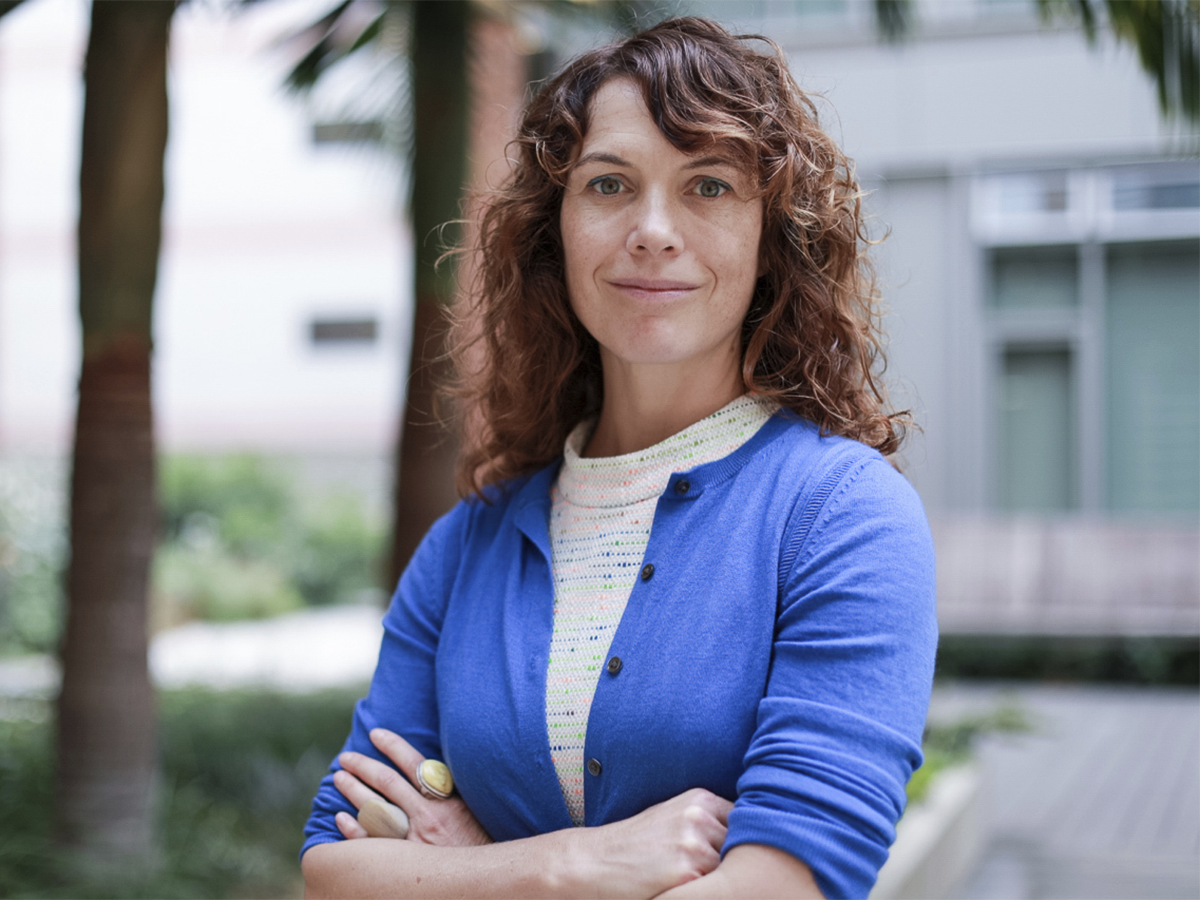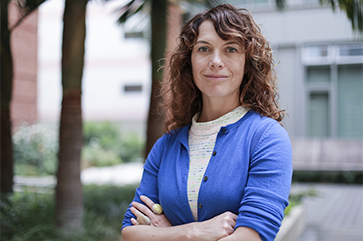‘The power of food’: UCLA Rothman Family Institute for Food Studies announces faculty director
Professor Amy Rowat is a longtime global leader in the field

Osvadlo Tarula
“It is such a thrilling time for food studies at UCLA — RFI will draw this remarkable community together, further amplify our efforts and take everything to the next level,” said Rowat.
By Jonathan Riggs | October 28, 2024
As part of solidifying the inaugural leadership team, Amy Rowat, the RFI’s inaugural faculty director and UCLA’s Marcie H. Rothman Presidential Chair in Food Studies, was named the first faculty director of the UCLA Rothman Family Institute for Food Studies. She and Jack Bobo, currently the director of the University of Nottingham’s Food Systems Institute, will lead the trailblazing institution.
A global leader in the field, Rowat is a biophysicist, professor and vice chair of integrative biology and physiology. She is also founder and director of the UCLA Science&Food nonprofit and co-director of the UCLA Semel Healthy Campus Initiative Center’s EatWell pod. She recently made headlines for her research into cultured meat, as well as for spearheading the new UCLA Science&Food Future of Food Fellows program.
“It is deeply meaningful to announce Amy Rowat as the first faculty director of the UCLA Rothman Family Institute for Food Studies,” said Adriana Galván, dean of undergraduate education. “A Bruin force of nature, she has long been pioneering this field across UCLA, Los Angeles, the U.S. and the world, pushing science forward and building community at every level. I know she’ll do the same — and more — with RFI.”
We asked Rowat to share her thoughts as she takes on this new role.
What does it mean to you to become the inaugural faculty director of the UCLA Rothman Family Institute for Food Studies?
It’s a great honor! This exciting milestone builds on work that I and others on our campus have been doing over the past decade to build a culture and community around food that encompasses research, education and public engagement. It is really a culmination of efforts spearheaded by the Semel Healthy Campus Initiative (HCI) Center, our UCLA Science&Food organization, the UCLA Food Studies minor, the UCLA Community Programs Office, the Food Studies Graduate Certificate Program and countless other groups on campus. RFI will create an overarching platform that will uplift a lot of this ongoing work while also creating new initiatives and opportunities. I’m really looking forward to it.
You’ve been such a leader in this space — what has changed since you first started studying food?
There’s been a lot of movement on campus. A big part of that is thanks to the support of Marcie Rothman and the Rothman family, building up our UCLA Teaching Kitchen facilities and creating more spaces where students, community members and faculty can engage with food — and support for them to do so. We’ve learned how effective this hands-on experience is for getting students to learn science and to start thinking more deeply about critical societal challenges we’re teaching them about. That could be anything from how to navigate diverse media perspectives, the environmental impact of foods, or even how to cook nutritious food on a budget to ensure access to healthy meals for all.
We’ve seen more exciting interdisciplinary programming emerge. Initiatives like Fiat Lux bring together faculty from across disciplines around food-related topics and strengthen our undergraduate teaching engagement.
It’s also been inspiring to use food to build community on campus. For example, our “Cooking and Conversations” initiative is something that that we’ve been working on with support from the National Science Foundation, Semel HCI, and the RFI. The initiative is designed to strengthen a sense of belonging for students on campus — feeling isolated and a lack of belonging is a major issue, especially for students from underrepresented groups — so we’ve been focusing on bringing graduate students to cook together with their faculty mentors in the UCLA Teaching Kitchen. That initiative really underscores the power of food to build community and to create inclusive learning and research spaces at UCLA.
Research-wise, a lot has changed as well, including in my own domain of sustainable foods and alternative proteins. A decade ago, for example, Beyond Meat was a fledgling startup in El Segundo; fast forward to today and you can see how much the landscape has transformed. Compared to where things were when I started, I love how far the conversation has come in terms of how we’re thinking about meeting the needs for more sustainable, nutritious foods with access for all — and I’m excited to see how we move it forward even further.
How would you characterize the student reaction to this area?
They have such a vivid interest in food! As chair of the food studies minor, I’ve seen its tremendous growth firsthand. We never anticipated that there would be so many students registered in our minor — now ~80, or that so many students would tell us how their studies of food transformed the way they think — from critiquing media information to shaping their future careers. In my own lab, I can also speak to the intense student enthusiasm and passion that’s driving students to make a difference. For example, a strong driver of our lab’s research into cultivated meats was a student in my group, Stephanie Kawecki, who’s now a postdoc. She came with a vision to transform our food systems and others have joined her — in my group, and from across campus in our UCLA Future Food Fellows program. It is really gratifying to see the next generation of leaders who are extremely mission-driven and passionate about a sustainable food future.
What inspires you about the future of RFI?
I’m inspired to build on the intense interest, enthusiasm and passion of people all across campus, from public health to arts and architecture to the law school and beyond. To address the grand societal challenges through the lens of food demands efforts that integrate perspectives from across disciplines, uniting North and South Campus.
Of course, L.A. is one of the most diverse food cities in the country, and we have done so much work over the years building and strengthening our community engagement on campus and off, whether that’s in partnership with UCLA Dining, the Hammer Museum, or nonprofits or festivals like the L.A. Times Food Bowl. Building on the tradition of UCLA Science&Food to bring together chefs and other food luminaries with scientists to timely conversations on topics around food, we have great opportunities to expand on it all.
And, of course, the great talent at RFI, led by our new executive director, Jack Bobo, who brings extensive experience with and vision for the future of food systems. It is such a thrilling time for food studies at UCLA — RFI will draw this remarkable community together, further amplify our efforts and take everything to the next level.




